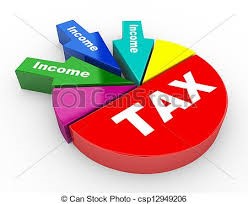
What a great rhetorical question! It’s especially apropos to ask while you comb through tax forms this year. Seven states in America currently don’t have income tax – Alaska, Florida, Nevada, South Dakota, Texas, Washington and Wyoming. New Hampshire and Tennessee residents are also spared from forking over a portion of their paychecks on tax day (April 15), though they do pay tax on dividends and income from investments.
A few other states have recently considered joining the no-income-tax bandwagon.
The main benefit, proponents say, is that income states flourish. Their unemployment rates are lower; they have fewer educated workers leaving their states. But there’s always another side of the coin. “It’s a way to disguise taxes to people,” says Curtis Skinner, a labor economist at Columbia University. States still need balanced budgets, and the Skinner school of though says the substitute for income taxes tends to be a system that puts an unfair pressure on people living in poverty.
But let’s consider all sides.
They’ll get you somewhere else
The obvious question: How do states pay bills without income tax? The answer is in about everything we do and use – our food, our clothes, the gasoline we put in our cars. Many of these goods are taxed by the state, and this is how they make ends meet.
A prime example is Tennessee. It has the highest sales tax in America. AKA The Volunteer State, Tennessee recoils from income taxes so much that voters changed the Tennessee Constitution last year to forbid these taxes for good, and charges a 7% sales tax statewide. It jumps to 9.45% when combined with local sales taxes, according to estimates from the Tax Foundation. Do the math. That’s over double Hawaii’s combined tax rate. New Hampshire’s homeowners pay some of the highest effective property taxes in the nation. Wyoming and Alaska make up for the no income taxes revenue through their natural resources. Both states have hefty tax revenues; Wyoming for coal mining and Alaska for oil drilling operations. Florida, South Dakota, Washington, and New Hampshire all have MUCH higher costs of living. There are no income taxes in the aforementioned states, but a tax here and a tax there contribute to higher-than-average living expenses in some of those states.
Don’t expect much in the way of economic benefits
Gov. Bobby Jindal wishes for Louisiana to join the no-income-tax club. “We need to do more to stay competitive,” Jindal told state lawmakers in 2013. “States with no income taxes are outperforming other states in terms of economic growth and population growth.” Jindal is not alone in this mentality. Policymakers in several other states – Kansas, Michigan, Nebraska, Ohio and Wisconsin to name a few – have either cut income taxes, or are considering eighty-sixing them altogether. They figure it will have a positive domino effect. Cutting the income tax will boost everyone’s take-home pay. In turn, it’ll attract more residents, draw new businesses, and create jobs and an influx of talented workers.
But does this state utopia, due to no income taxes, really ever exist? Well, Texas, America’s oil industry star, has certainly has job creation stats that have steadily climbed over the past decade. But it hasn’t always been the case for other states with no income tax. There simply aren’t enough case studies to prove that states slashing or obliterating income taxes jumpstarts the economy.
It’s another disadvantage to the economically disadvantaged
Income taxes, while bothersome as gnats, help the poor. They
redistribute wealth because they’re “progressive,” meaning that wealthier people pay higher taxes than lower earners. Other taxes usually don’t possess this Robin Hood-like characteristic. Sales taxes are considered “regressive” because they don’t depend on the consumer’s income level. The playing field is level, no matter what the person earns. Everyone pays the same for food, gasoline, and other key consumables.
These taxes disadvantage the poor, Columbia’s Skinner says. People who are already economically strained pay sales taxes that don’t impact people with more wealth. Wealthier residents have the luxury to squirrel away funds in stocks, 401(k)s, and other investments, and have a much smaller exposure sales taxes. “So the bite is proportionally larger for the poor than it is for higher earners,” he says. “Especially for states that tax food and essentials like that.”
If you’re someone who thinks the government should actively shape society, then you’ll probably be camp state income tax. States redistribute wealth from rich to poor, and policymakers can use state tax incentives to encourage people to do helpful things with their money, like give to charities. But if you have a more laissez-faire mentality, then you might embrace living in one of America’s no-income-tax states.
Richard Fleming, MBA
State Tax Group, LLC is a state and local tax advisory and consulting services firm, specializing in sales and use tax consulting, sales tax outsourcing, audit representation, tax compliance review, voluntary disclosure agreements, general state and local tax consulting services. For more information on how we can make state taxes smooth sailing for you, call us toll-free at 800.952.8996; or visit www.statetaxgroup.com.

